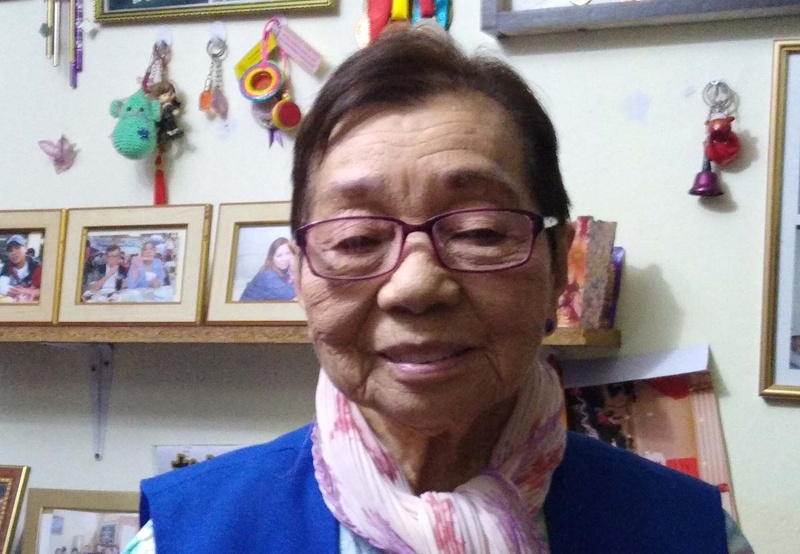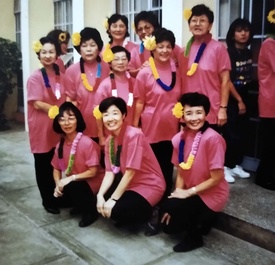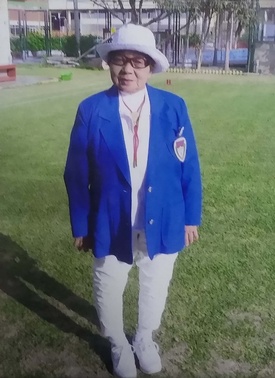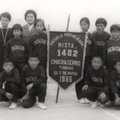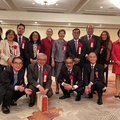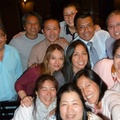The first thing that surprises you about Shigueko Unten is that she doesn't look anywhere near her 93 years old, almost 94. One would easily put her in her mid-70s. Furthermore, she walks upright and radiates liveliness.
“They have made me sing a lot,” he says. He has just returned home after spending the day at the Ryoichi Jinnai Center, a recreation space for Nikkei seniors at the Peruvian Japanese Cultural Center.
She lives alone, but she doesn't feel alone. She has many friends.
His memory is intact. Inquiring into your past is like asking ChatGPT something: it responds instantly, without hesitation.
Thanks to the clarity of his memories, it is possible to rescue fragments of his life, some of which date back to Okinawa in the 1940s.
OKINAWA, WAR TIMES
Shigueko Unten, daughter of an Okinawan couple, was born in Peru. There were nine brothers.
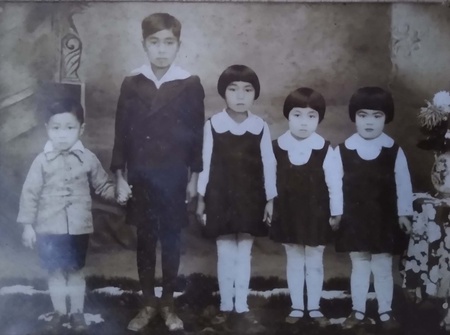
He studied in Lima Nikko, the largest school in the Japanese colony in the country (it had about 1,800 students). “I don't know why my dad enrolled me there,” says the obaachan.
In Lima Nikko there were few uchinanchus, he explains. Most of them were in another school, Hoshi Gakuen.
He was 12 years old when he traveled with his then-ill mother to Okinawa. Shigueko didn't know it, but her life was going to turn around. What he thought would be a temporary stay in the land of his ancestors became a crucial stage in his existence that lasted around a decade and a half.
Her mother, now recovered, left her in the care of an uncle (Shigueko's father's brother) and traveled alone to Peru.
“Okinawa was inaka ,” recalls the obaachan. There was a lot of poverty. He lived very close to the sea and at his school they used the beach sand to write because there were no teaching materials.
The Okinawans went barefoot. She went up and down hills on bare foot, sometimes in the middle of the rain. All distances were covered by walking.
They ate pure sweet potatoes. Shigueko used to carry baskets full of the tuber on his head. “That's why I'm short,” she jokes. Rice was for “millionaire people.”
They didn't have electricity at home. Lighting came from kerosene, the use of which was rationed so as not to spend too much.
The Second World War prevented Shigueko from completing his studies. The priority was to defend Okinawa from the United States.
The students, he remembers, were ordered to dig holes in the ground so that the American soldiers could sink into them.
Likewise, they prepared them to pierce the enemies who descended by parachute with bamboo sticks. Today he laughs at that childish plan.
Once Okinawa was defeated, families took refuge in caves to avoid falling into the hands of American soldiers.
When they believed that one cave was no longer safe (or were warned about it) they went to another. They moved at night.
The hasty moves ended when one day they heard a Nisei American soldier who spoke Japanese tell them: “If you don't come out (of the cave), we are going to drop a bomb.”
“No one wanted to go out,” says Shigueko, who was 16 years old at the time. “It doesn't matter, we'll just die here,” they thought.
They were resigned to doom, but luckily the Americans insisted that they leave their hiding place. “Because they talked so much, I came out with my hands raised,” he recalls.
The enemies did not kill her. Nor to those like her who came out of the cave. It was not true that the Americans executed civilians who surrendered, as many Okinawans believed.
“I have suffered enough,” he says about that stage of his life marked by destitution and war. But he does it without overloading the ink, far from victimizing himself, as someone who simply communicates a fact.
“When I talk about war, it dawns,” he smiles. It means that I could tell stories about the war with the United States for hours and hours.
A NEW JOURNEY
When WWII ended, there was no time for hatred or resentment. It was a waste of energy. There was only room for survival. And to survive, the Americans were indispensable.
Shigueko found work in the home of a family made up of an American officer, his wife and the couple's baby. I took care of the akachan, cooked, washed.
He says he was lucky. He had a good family (other Okinawans did poorly with their American employers) and earned a decent salary.
She spent seven years with them, until she married an Okinawan who also worked for the United States.
She was a mother twice in Okinawa. They were not rich by any means, but poverty was behind them. They had their lives assured.
“In Okinawa we didn't lack anything, we didn't suffer anything for money; On Sunday we went to eat on the street because he was a hard worker,” she says, referring to her husband.
And it was her spouse who was the driving force behind the second turnaround in the obaachan's life. Without him, she probably would have stayed in Uchina forever.
Her husband had the idea of migrating to Peru. And not for him, because he had no family there, but for Shigueko, who still had his mother and brothers (his father had already died).
Thus, Shigueko, her husband, her 4-year-old daughter and her eight-month-old baby set sail on a ship on a trip to South America that lasted 52 days. But they did not arrive in Peru, but in Brazil.
His family of Japanese nationality could not enter Peru due to a discriminatory policy of the Peruvian government.
Brazil, where Shigueko had an aunt who took them in, was a temporary destination for the Unten while in Peru her brothers arranged the necessary papers so that everyone could enter the country.
With everything settled, the family finally managed to settle in Peru. But there were no longer four, but five: a girl had been born in Brazil.
BUSINESS WITH TANOMOSHI
“I felt sorry for him,” says Shigueko about her husband, referring to his complete ignorance of Spanish when they first arrived in Peru.
However, they had the support of the obaachan's mother and brothers, and with the money they got from a tanomoshi they acquired a toy store for sale. This was the business that allowed the Unten family to get ahead and raise their children. Later they owned a restaurant.
The decades passed and the boys grew up and started their own families.
Life seemed resolved for Shigueko, but at 61 years old, already a widow and close to retirement and the serene enjoyment of old age, she surprised with a change of direction.
He traveled to Japan, but not to go sightseeing or visit a relative, but to work. He was a dekasegi for three years, working in the kitchen of a hotel in Shizuoka ken, where he prepared tsukemono, among other things.
TROME IN GATEBALL
Now is the time of enjoyment for Shigueko. Poverty and war in Okinawa, the subjugation that comes with having your own business in Peru and the hard work in Japan are a thing of the past.
Her life today is, for example, Thursdays with her friends at the Jinnai Center. When asked what he likes to do most there, he immediately answers: “Dancing.” Then he adds: “I like to dance everything.” And he concludes: “I like to sing.”
Gateball is another of his passions. And not as mere entertainment. Almost 40 medals decorate one of the walls of his house, clear evidence of his sporting merits. “In gateball we are tromes,” he boasts reasonably about his team. He has even competed in Hawaii. Now it's kantoku.
He likes this sport so much that when he had his restaurant he practiced it with a broom and a lemon.
The talk oscillates freely between the past and the present when suddenly the obaachan smiles and says: “I'm just Peruvian.” It refers to his nuclear family. To recap, it's true: her husband and two oldest children are Okinawans. The fifth member, their youngest daughter, was born in Brazil.
As a Peruvian citizen, she expresses her concern about the situation in the country (“Peru was not like that. Peru has always had thieves, but they didn't kill, now they kill”).
However, it feels closer to Okinawa. He says that he returned to the island around 30 years after his migration to South America. He was shocked. The Okinawa inaka of his childhood and youth had disappeared. “I was scared, how it has changed. The poverty that was there in my time was no longer there,” he says.
Since then he visits her more or less every ten years.
He has a daughter in Tochigi ken who wants her to move to Japan. The obaachan hesitates: “Sometimes I want to go, sometimes I don't.” Leaving Peru would mean no longer seeing her friends—or chatting, having fun, having lunch, going for a walk, singing, or dancing with them—of Jinnai and gateball. I couldn't go swimming at AELU either. Nor do radio taiso. To think about it.
A son (the second) resides in Aichi Ken, who travels to Lima every year to see and take care of his mother for a while. His other daughter, the eldest, lives in Peru.
LITTLE SISTER UCHINANCHU
The obaachan holds a michelin around her waist with her fingers and comments that it looks like a sumotori. Then he touches his arm and says, “Everything is hanging.” She then adds: “After corona I am hoarse.”
After listing in a humorous way the havoc caused by old age and the pandemic, he clarifies: “I'm fine if I don't have bad hearing.”
Perhaps good spirits and joy explain to a large extent not only why she has reached a ripe age, but also how: healthy, whole, with full spirit.
Its longevity also finds echo in the genes. His mother lived to be more than 90 years old. “Part of my mother, they have long lives. But part of my dad, 60 (years old) just die,” he points out.
When asked what the recipe is for living so long (and well), he laughs. “I am a friend, a good friend,” she says. “They love me enough. I don't have a name, they call me 'chodewa' ('little sister' in Okinawan). Even Naichi, who plays gateball, tells me: 'Hello, chodewa, how are you?'” he adds.
“Everyone loves me, that's the main thing,” he concludes.
© 2023 Enrique Higa


